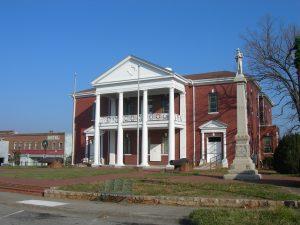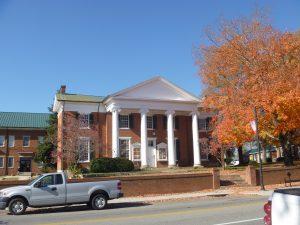The Impact of CFPF Funding on Martinsville, Halifax, and South Boston
Written by: Lauren Petty
Problem Identification

With the onset of an increase in flooding activities throughout Virginia, the southern portion of the state has been critically affected. In many of these areas, a lack of sustained infrastructure and adequate resources causes a ripple effect, as one flooding event impacts preparedness for the next. One report described the phenomenon as such: “The repercussions and cascading effects of flooding events in this region are not limited to local impacts on public safety and roads, community livability, and economic viability; they impact vital regional and statewide economic and transportation corridors as well.”
Three localities profoundly affected by the absence of resilient flood planning are the City of Martinsville, the Town of Halifax, and the Town of South Boston. All are classified as “low-income geographic areas” based on their high social vulnerability index scores and below-average median household incomes – in fact, each of their reported household incomes is below 80% of the average across the state. Additionally, they all share a high population of mobile-home dwellers and long-term renters as opposed to full-fledged homeowners. There is very little in terms of an established resiliency plan in these communities due to the lack of funding available to them.
Throughout the past decade, each of the aforementioned areas experienced critical flooding events which broadly disrupted the community. In Martinsville, May of 2018 brought rains which destroyed a portion of road that took weeks to repair. Five months later, the Banister Dam in Halifax was almost overwhelmed by the enormous amount of water after a storm. This same storm wreaked havoc in South Boston, and two years later another flooding event caused businesses to report destroyed wares. With few resources and virtually no means of preparing themselves, the localities experienced the same harsh consequences of flooding time and time again.
Engagement with the Virginia Community Flood Preparedness Fund

In November of 2021, the executive director of the Southside Planning District Commission (SPDC) put forth a Capacity Building and Planning Application, as a part of a request for a grant from the Virginia Community Flood Preparedness Fund (CFPF). The concerned stakeholders were Martinsville, South Boston, and Halifax. They were working alongside the SPDC, whose representatives acted as the liaisons for these communities. While South Boston and Halifax are both located within SPDC’s domain, Martinsville belongs to the neighboring planning district. However, risks of difficulties impacting all areas superseded the typical regional planning procedure. In addition, various teams from the University of Virginia took part in the project. The Weldon Cooper Center for Public Service directed project undertakings, while the Department of Engineering Systems and the Department of Urban and Environmental Planning provided supplementary assistance.
In the application, the localities requested $135,000 to complete various objectives in flood resiliency planning, with the overall goal of creating a roadmap which identified areas to focus on. The application stated, “Through this project, these communities will receive valuable, critically needed technical assistance and gain a better understanding of the flood risks they are facing, available resources, and gaps in capacity and needed information.” The project was to begin with an analysis of current resources and databases available to the concerned communities. This assessment would also evaluate the knowledge and readiness of staff in each region, as well as the engagement of the broader community with respect to flooding occurrences.
To learn more about the CFPF application process and the impact of the project, Chad Neese was consulted. Neese is a Senior Planner and GIS Specialist for SPDC. When asked what SPDC was initially hoping to accomplish with the funding received from CFPF, Neese stated, “We needed a thorough review and assessment completed on our collective resources, plans, and policies to identify any potential gaps that could hinder community resiliency as it relates to flood events. That would then put the SPDC and our localities in a position to better address these foundational issues.”
Implementation, Evaluation, and Next Steps

Neese views the project as being broken into four clear phases – “Phase 1 is complete with the drafting of the Southern Virginia Flood Resilience Plan Roadmap and we’re currently beginning work on the 2nd phase. This will include closing identified gaps, conducting capacity and resiliency planning, and developing approved resilience plans through DCR.”
At present, Neese sees the primary area of focus for the SDPC as “Taking the findings from the Southern Virginia Flood Resilience Roadmap and incorporating them into our soon to kickoff update of the Regional Hazard Mitigation Plan. We hope to address as many identified gaps as possible through the regional planning process to the benefit of our localities.”
Regarding large-scale impact, Neese says, “This project hasn’t necessarily created that large physical improvement that can easily be pointed out to the community. Those types of physical results will most likely come later. The actual impact has been more at the planning and policy level, essentially helping us realize any deficiencies and what steps are necessary to address those.” That being said, South Boston in particular has made notable strides toward improving resiliency. The Virginia Department of Emergency Management (VDEM) has created a Hazard Mitigation Grant Program which in essence allows landowners in heavily flooded areas to sell the land directly to the town. Through this program, it is intended that businesses can move off of the floodplain with assistance from the town itself. South Boston is transitioning in a positive direction toward increased flood planning, and it is hoped that the rest of Southside is soon to follow.
Moving into 2024, SPDC intends to focus on the gaps in flood resiliency planning identified by the project. According to Neese, “The SPDC is currently planning for a kickoff meeting to update the Regional Hazard Mitigation Plan and staff from the towns of Halifax and South Boston have both expressed an interest in the SPDC assisting with a thorough review and updating of their floodplain ordinances later this year. This will help address those identified gaps and allow for the creation of robust resilience plans for the localities.” The formation of these plans will continue to be a collaborative effort between SPDC, the localities, and the University of Virginia.
Download the Report
Author
Lauren Petty is a 4th year student studying Systems Engineering at UVa. She completed this case study for her J-Term internship in January 2024. Lauren will graduate in May 2024.




